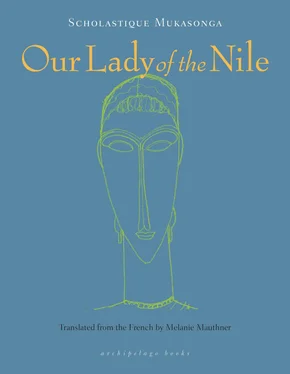The following Sunday, after Mass, Gloriosa told Modesta:
“Hurry up, we’re going to the spring. I want to check out the place and see how we can race up to the Virgin of the Nile’s hut. We need to know exactly how we can climb up there.”
“You still want to do what you told me?”
“Of course, more than ever, and I’m counting on you if you still want to be my friend.”
“It scares me,” sighed Modesta. “I don’t have a father like yours … but I’ll help you since you say I’m your friend.”
It was raining. As they walked along the track, Gloriosa and Modesta passed a few women on the way back from Mass, carrying their little benches on their heads.
“We really live in the clouds,” said Modesta.
“I like this rain,” said Gloriosa. “I wanted this rain and I didn’t need Nyamirongi to make her come. There’ll be no one going to pray to Our Lady of the Nile, even those who wanted to ask her for good grades, they won’t venture up there.”
They scrambled down the steep path to the spring, twisting their ankles in the gullies and grabbing on to shrubs to avoid slipping. They stopped at the edge of the basin where the Nile pooled before flowing on toward its river destiny. The statue of Mary seemed to tower out of reach beneath its sheet-metal shelter, which had been jammed — goodness knows how — between two huge rocks. Despite this protection, the rainy seasons had taken their toll on the statue. Her black face was marbled with white streaks, and her clasped hands and bare feet were speckled with patches of the same color.
“It’s Our Lady of the Zebras,” hooted Gloriosa. “See, she needs repainting, or rather changing, and that’s really such a Tutsi nose, even if it’s an albino Tutsi nose.”
“Shut up. Don’t say stuff like that, it’ll bring us bad luck.”
They climbed the scree slope, maneuvering round the huge rocks, all smooth and gleaming. In the crevice between them, four poles supported a platform made of planks, covered in moss and lichen, on which the Virgin’s nook had been erected.
“You see,” said Modesta, “it’s too high. We’d need a ladder.”
“You’ll be the ladder. Take me on your shoulders and I’ll hoist myself up by grabbing on to the planks while you hold me steady and push. We’ll get there.”
“Gloriosa, you’re crazy!”
“Do what I say, and don’t argue, if you still want to be my friend.”
Modesta crouched at the foot of the platform. Gloriosa swung a leg over and settled on her shoulders.
“Go on, stand up.”
“I can’t, you’re too heavy. And with your big butt in the way, I can’t see.”
“Grab on to the post.”
Modesta gripped hold of the post, slowly lifting Gloriosa, who encouraged her: “Come on, keep going, we’re almost there!”
“That’s it,” said Gloriosa. “I’ve got my elbows on the planks. Watch out, I’m pulling myself up, hold steady, I’m there.”
Gloriosa managed to slip into the narrow passage between the rock and the sheet metal. She stood up and Modesta saw her disappear into the shelter.
“That’s it, I’m touching her. I’m taller than her. See how easy it’ll be, a good knock on the nose, and done!”
Gloriosa ran back between the side of the shelter and the rock.
“Watch out,” she cried. “I’m going to jump, catch me!”
Gloriosa jumped and fell on top of Modesta, dragging them both to the ground.
“Look at the shape we’re in,” said Modesta, getting up. “My skirt’s all muddy and torn, look right here, and my legs are all scraped up. What on earth will we tell the monitor?”
“We’ll say we slipped on the way to pray to Our Lady of the Nile. They’ll feel sorry for us and praise our piety. Or instead we’ll say it was bandits who attacked us and tried to rape us, but we escaped. I prefer the second version, we’re courageous girls who were attacked by the Inyenzi, there’s still some of them in these mountains …”
“You know very well there are no Inyenzi left, the Tutsi are traders in Bujumbura and Kampala now.”
“My father says we must repeat, again and again, that the Inyenzi are still there, that they’re always ready to return, that some do still get out and are among us, that the Tutsi who stayed behind eagerly await them, and perhaps even half-Tutsi like you. My father says we must never forget to frighten people.”
Gloriosa figured that to make their tale sound credible when telling the monitor, it was better to wait until dusk before returning to the lycée. They took shelter in the abandoned shepherd’s hut farther down the path at Remera. They stretched out on a bed made of layers of thick grass that seemed to have been recently replenished. “See,” said Gloriosa, “the hut is used, even if the bed’s a bit firm for the things people come here to do. I’ll eventually find out who meets here.” She stretched out on the bed: “Come lie next to me and lift your dress. You know what needs to be done to prepare for marriage, it’s what our mothers always did.”
“My poor girls, whatever happened to you?” cried Sister Gertrude when she saw Gloriosa’s and Modesta’s torn, muddy clothes.
“We were attacked,” said Gloriosa, her voice breaking with emotion, “men with dark cloth disguising their faces, I don’t know how many, but they pounced, I’m sure they wanted to rape us, probably even kill us, but we fought back, we picked up stones, we screamed, they heard a Toyota coming and got scared, they fled … But I know who they are, I heard what they were saying, it was the Inyenzi, there’s still some of them around, hiding in the mountains, my father said so, they come from Burundi, they’re always ready to attack us whenever they can, and they’ve got accomplices: the Tutsi here. We must warn Mother Superior.”
The two lycéennes were shown into Mother Superior’s office. Again, Gloriosa recounted the tale of the assault, but in this new version, the details were much worse: the number of Inyenzi kept on growing, and now it was the lycée they were preparing to storm, they wanted to rape all the pupils, and torture them horribly and kill them, the nuns wouldn’t be spared either, not even the whites. Modesta kept quiet: she made herself whimper and cry as Gloriosa had instructed. “Hurry,” insisted Gloriosa, “there’s not a moment to lose, we’re all in danger, the Inyenzi are close by, they’re everywhere.”
Mother Superior made the necessary decisions. She summoned Father Herménégilde, Sister Gertrude, and Sister Bursar for a war council. She sent Brother Auxile to Nyaminombe in his truck, and he returned with the mayor and the two gendarmes. She assembled the girls in the chapel, and Father Herménégilde made them sing hymns, interspersed with dozens of rosaries, without telling them why. Sister Bursar distributed kitchen knives to the lycée hands, carefully jotting down the number in her notebook, then took command of the brigade posted at the school gates. Night had fallen. Sister Bursar decided to hand out all the biscuits she’d been saving for the next pilgrimage. In the chapel, despite Father Herménégilde’s stubborn insistence on litany upon litany of hymns and rosaries, the spreading rumors finally got the better of him. It was whispered that the President had been assassinated, that the Inyenzi had crossed the lake, that the Russians had given them monstrous weapons, that they were going to kill everyone, even the young women, after raping them first … Many were in tears, some asked the chaplain to take their confession, others hoped, though they didn’t know why or how, that they’d escape the massacre, if not the raping.
The sound of Brother Auxile’s truck was heard. The suspicious guards, fearing that the truck had fallen into an ambush, opened the gates slowly, in spite of the driver’s impatient honking. With some relief, they saw that Brother Auxile had brought not just the mayor and the two gendarmes with their rifles, but also twenty militants armed with machetes.
Читать дальше












